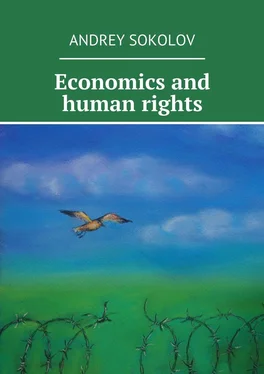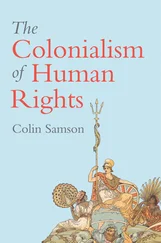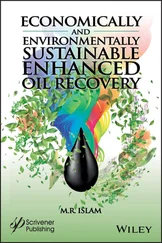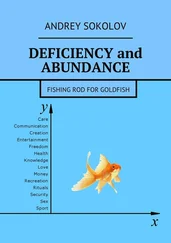Andrey Sokolov - Economics and human rights
Здесь есть возможность читать онлайн «Andrey Sokolov - Economics and human rights» — ознакомительный отрывок электронной книги совершенно бесплатно, а после прочтения отрывка купить полную версию. В некоторых случаях можно слушать аудио, скачать через торрент в формате fb2 и присутствует краткое содержание. ISBN: , Жанр: Юриспруденция, Публицистика, popular_business, Философия, на английском языке. Описание произведения, (предисловие) а так же отзывы посетителей доступны на портале библиотеки ЛибКат.
- Название:Economics and human rights
- Автор:
- Жанр:
- Год:неизвестен
- ISBN:9785449090874
- Рейтинг книги:5 / 5. Голосов: 1
-
Избранное:Добавить в избранное
- Отзывы:
-
Ваша оценка:
- 100
- 1
- 2
- 3
- 4
- 5
Economics and human rights: краткое содержание, описание и аннотация
Предлагаем к чтению аннотацию, описание, краткое содержание или предисловие (зависит от того, что написал сам автор книги «Economics and human rights»). Если вы не нашли необходимую информацию о книге — напишите в комментариях, мы постараемся отыскать её.
Economics and human rights — читать онлайн ознакомительный отрывок
Ниже представлен текст книги, разбитый по страницам. Система сохранения места последней прочитанной страницы, позволяет с удобством читать онлайн бесплатно книгу «Economics and human rights», без необходимости каждый раз заново искать на чём Вы остановились. Поставьте закладку, и сможете в любой момент перейти на страницу, на которой закончили чтение.
Интервал:
Закладка:
It is prohibited to smoke in public places, store and purchase more than 3g of marijuana, but you can grow one plant. Also, the use of cannabis (cannabis) for medical purposes is permitted.
Despite the ban on smoking in public places, marijuana can be smoked while driving a car. (56)
Brazil
In Brazil, marijuana is illegal, but for its storage (as well as for the storage of any drugs) is not threatened with prison. In 2006, the country adopted a law that introduced alternative types of punishment for drug addicts. Drug traffickers and drug addicts are subjected to fundamentally different punishments. (57)
United Kingdom
Since 2002, the storage of small quantities of hemp and its derivatives is not a crime. But the police can arrest those who use marijuana, for example, in the presence of children. (58) In the same year, the UK authorities transferred marijuana from Class B to Class C, which includes, for example, steroids.
June 17, 2016. two leading British public health organizations, the Royal Society for Health and the Public Health Council, called for the permission to store and use for personal use all types of drugs. Experts of the organizations believe that the British state policy on drugs has failed. The report, entitled “A New Approach to Drugs”, argues that criminal prosecution of drug addicts is ineffective and the threat of punishment only increases the chances of the addict dying of an overdose and is an obstacle for the treatment of drug addicts for medical care. The authors of the report call for the adoption of the Portuguese system in Britain, when people who are caught using drugs are offered help, and not punished. President of the Royal Society for the Protection of Health Shirley Kramer said that the time has come for a new approach, and we must recognize that drug use is a health problem, not a criminal law, and that those who use drugs illegally need treatment and support, and not punishment.
Venezuela
Since 1993, in Venezuela, for those who have been caught with two grams of cocaine or 20 grams of cannabis, the prison has been replaced by “measures of social impact”. Such people arrested for storing drugs for personal use are sent for treatment. (59)
Germany
The medical use of cannabis is legal since 2007. As of April 2016, hemp received 647 patients. Keeping marijuana can be both legal and not, depending on the amount of grass and local laws. Most laws of the various “lands” of Germany allow storing up to 5g of marijuana.
The German police do not pursue citizens for keeping a “small amount” for personal consumption. But can delay for smoking marijuana in public places, at school or in the presence of children. (60, 61)
Denmark
Since 2011, the Danish Medical Agency has authorized the use of three varieties of medical cannabis for a patient with cancer or multiple sclerosis. (62)
Israel
Since 1994, Israel has been allowed to use marijuana to people who suffer from cancer, Parkinson’s disease, multiple sclerosis, Crohn’s disease, chronic pain, post-traumatic stress disorder. (63)
Spain
Since 1992, in Spain, the use of marijuana is an administrative crime. For storage of “grass” or smoking on the street a fine of up to 300 euros is possible. Storing more than 40 g of cannabis, spreading and growing marijuana is a criminal offense (from 1 to 3 years). (64)
Smoking cannabis in public places is prohibited, but there are specialized clubs of marijuana lovers, which in Spain are about 500. (65)
Cambodia
In Cambodia, marijuana is illegal. Application for medical purposes or in cooking is not prosecuted. In local restaurants Happy Pizza with cannabis is openly sold, and in the markets – “cheerful” confectionery. (66)
Canada
Since 2001, smoking marijuana is permitted for medical purposes. The grass can be legally grown if there is a doctor’s order and a special permit that is issued to patients with various forms of cancer, AIDS, arthritis and multiple sclerosis. (67) In Canadian Vancouver medical marijuana is prescribed to people who complain of a bad dream. In mid-2015, the city had about 80 shops selling cannabis. (68) By 2018 full legalization of marijuana is planned. (1, 69)
Colombia
Since 2015, it is allowed to store up to 20g of cannabis and grow up to 20 plants for personal purposes. (70, 71, 72)
Malta
Since 2015, the storage of a small amount of marijuana and a number of other drugs has been decriminalized. The crime is not the presence of 3.5 g of cannabis, two grams of other drugs or two Ecstasy tablets. Excess is punishable by a fine of 50 to 125 euros.
Mexico
In Mexico since 2009, the presence of 5g of marijuana, 2g opium, 500mg of cocaine, 50mg of heroin, 40mg of amphetamine and up to 0.015mg of LSD is not a crime. (73)
Netherlands
Drugs are officially divided into “light” and “heavy” since 1972. (74)
Storage of 30 g of “light” drugs is decriminalized. “Heavy” drugs are prohibited. In Amsterdam, Rotterdam, The Hague, Utrecht and in 100 cities, legal coffeeshops with permission to sell marijuana, hallucinogenic fungi and other light drugs work. The purpose of legal coffeeshops is to compete with illegal heavy drugs.
However, the storage, production and sale of any drugs are illegal. This is a bit inconsistent and hypocritical. But coffeeshops and their clients, who want to be law-abiding, manage to fit into a 30-gram “Procrustean bed”. People over the age of 18 can buy up to five grams of cannabis daily in coffeeshops. The purchase of drugs on the street is illegal.
Paraguay
Since 1988, it is allowed to store for personal use up to two grams of cocaine or heroin and up to 10 grams of cannabis. (75)
Portugal
Portugal decriminalized drugs in 2001. What does it mean? Drugs remain illegal, but their storage for personal purposes will not lead to prison. Even heroin. (76, 77) At the same time, the sale of drugs is prohibited.
In Portugal it is allowed to store one gram of heroin, MDMA or amphetamine, two grams of cocaine and up to 25 grams of cannabis. If such stocks are discovered, the police do not arrest the addict, but sends them to the “explanatory commission”, which consists of lawyers, social workers and psychologists. Multiple meetings with the commission may result in sending for treatment.
The Commission can take one of the following decisions:
– fine from 25 to 150 euros;
– to forbid to occupy posts that assume responsibility for someone else’s life;
– prohibit visiting night clubs;
– prohibit traveling abroad;
– prohibit the carrying of weapons;
– confiscate all personal drug stocks;
– to deprive state benefits, if any (very serious, by the way, a measure, since the size of the benefit is close to the minimum wage, that is, it can be a full-fledged source of personal income).
The measures are quite reasonable – the main task of the commission is to try to motivate a person to treat and to protect the lives of people with whom he, in one way or another, communicates.
At the same time and everywhere in Portugal dozens of state centers for the provision of assistance, detoxification and psychological rehabilitation of drug addicts work. Opiate drug addicts undergo substitution treatment with methadone and buprenorphine. Regional reintegration programs conduct regular trainings for former drug addicts, help with finding work and housing. Portuguese pharmacies for free exchange used syringes for new ones, as well as issue a set of several syringes, a condom, cotton wool with alcohol and a brochure about rehabilitation. Similar sets are distributed in the streets.
Decriminalization of drugs in Portugal has led to a sharp decline in the number of HIV-infected people, deaths from overdose and heroin addicts.
Читать дальшеИнтервал:
Закладка:
Похожие книги на «Economics and human rights»
Представляем Вашему вниманию похожие книги на «Economics and human rights» списком для выбора. Мы отобрали схожую по названию и смыслу литературу в надежде предоставить читателям больше вариантов отыскать новые, интересные, ещё непрочитанные произведения.
Обсуждение, отзывы о книге «Economics and human rights» и просто собственные мнения читателей. Оставьте ваши комментарии, напишите, что Вы думаете о произведении, его смысле или главных героях. Укажите что конкретно понравилось, а что нет, и почему Вы так считаете.












